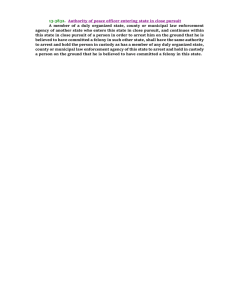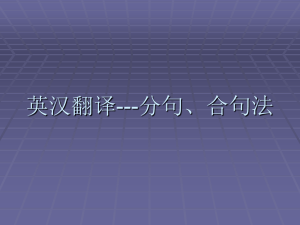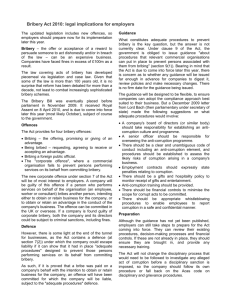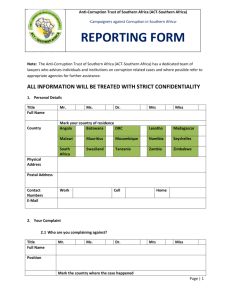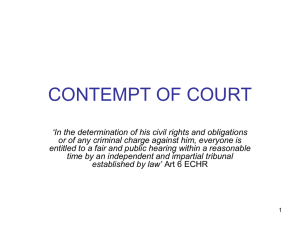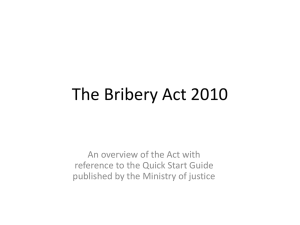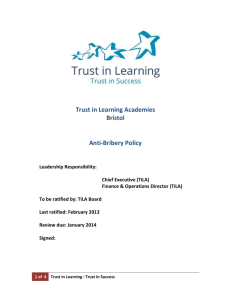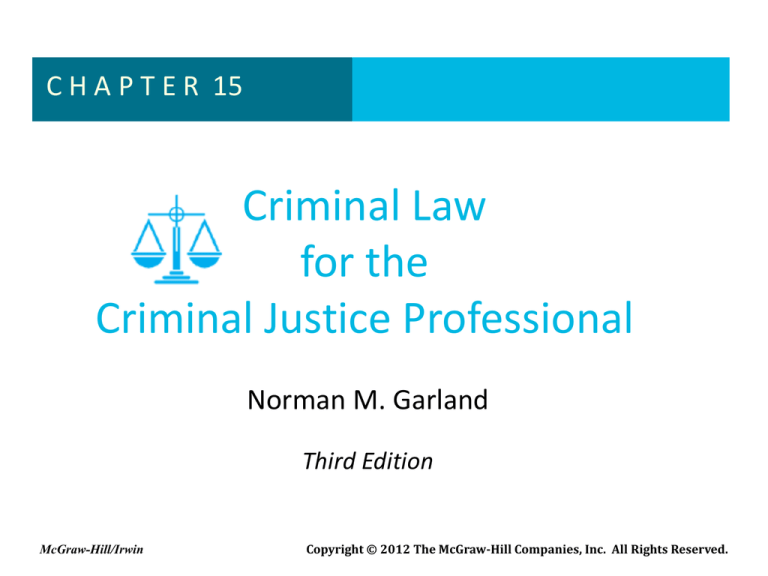
C H A P T E R 15
Criminal Law
for the
Criminal Justice Professional
Norman M. Garland
Third Edition
McGraw-Hill/Irwin
Copyright © 2012 The McGraw-Hill Companies, Inc. All Rights Reserved.
C H A P T E R 15
Crimes against the
Administration of Justice
Slide 15-2
15.1
15.2
15.3
15.4
15.5
15.6
15.7
15.8
Obstruction of Justice
Bribery
Perjury
Obstruction of Justice
Resisting Arrest
Compounding and
Misprision of a Felony
Escape
Contempt of Court
CHAPTER OBJECTIVES
Slide 15-3
1.
2.
3.
4.
Recognize the difference between the
offenses of bribery and commercial bribery.
Define the elements of perjury.
Define the offense of obstruction of justice
and recognize the scope of crimes it covers.
Describe the crime of resisting arrest.
CHAPTER OBJECTIVES
Slide 15-4
continued
5.
6.
7.
8.
Recognize the offense of compounding
a felony, and explain why it is different
from the offense of misprision of a felony.
Define the elements of the crime of escape.
Recognize when constructive contempt takes
place and how it differs from direct contempt.
Differentiate between the offenses and penalties
for civil contempt and criminal contempt.
15.1 Obstruction of Justice
Slide 15-5
obstruction of justice
The act by which one or more persons attempt to or
actually prevent the execution of a lawful process.
• Crimes include:
– Bribery and extortion
– Perjury, false testimony, and interfering
with a law enforcement officer
– Tampering with the jury process
– Suppressing or refusing to produce evidence
relevant to a grand jury investigation
Application Case
Slide 15-6
– 15.1
Florida v. Saad
15.2 Bribery
Slide 15-7
• Common Law Bribery
– For 700 years in England and later in U.S.,
extortion most common public offense
• Recently, bribery
prosecutions became
more prevalent
Modern Bribery
Slide 15-8
• Modern concept of bribery
focuses on exploitation of
public power for personal gain
quasi-bribery
An extension of the crime
of bribery to include
people other than public
officials whose functions
are considered important
to the public.
Modern Bribery
Slide 15-9
• (MPC) forbids:
– Law enforcement and public
officials to receive gifts from
individuals subject to their jurisdiction
– Public servant who has the authority and
discretion over contracts or transactions to
accept or solicit gifts from any person “known
to be interested or likely to become
interested” in such contract or transaction
Commercial Bribery
Slide 15-10
commercial bribery
The giving, receiving, or soliciting of anything of value to
influence an employee or professional in the performance
of his or her duties.
• Distinction in the business community
between legal favors and bribery
• It becomes bribery when
there is a quid pro quo payoff
15.3 Perjury
Slide 15-11
perjury
Making false statements
under oath or affirmation.
false swearing
The giving of a false oath
during a proceeding or
matter in which an oath is
required by law.
subornation of perjury
The crime of procuring another person to make a false
oath.
Application Case
Slide 15-12
– 15.2
People v. Sharpe
15.4 Obstruction of Justice
Slide 15-13
• Act considered to obstruct justice must
have some relationship to the act of
justice defendant is seeking to avoid
• Under MPC, obstruction of
justice does not apply to those
resisting arrest or fleeing from crime
Witness Tampering
Slide 15-14
• Requires intimidation, force, threats,
misleading conduct, or corrupt persuasion
with intent to influence, delay, or
prevent testimony or cause person to
withhold a record, object, or document
witness tampering
Illegal conduct with the intent to influence witness
testimony, such as by approaching a potential witness
with threats or other means to prevent the witness from
testifying.
Suppressing Evidence
Slide 15-15
suppressing evidence
A crime that occurs when a defendant, or a person
working on behalf of the defendant, suppresses (hides),
destroys, or refuses to produce evidence relevant to a
grand jury investigation.
• To be convicted:
– Have knowledge of pending
grand jury investigation
– Know documents are covered by a subpoena
– Willfully conceal or endeavor to
conceal documents them from grand jury
Application Case
Slide 15-16
– 15.3
United States v. Baldyga
15.5 Resisting Arrest
Slide 15-17
• If person believes
arrest is unlawful,
can s/he resist
an unlawful arrest?
– Some laws forbid
resisting arrest in
any circumstances
• People v. Volition
resisting arrest
Physical efforts to oppose a
lawful arrest.
Application Case
Slide 15-18
– 15.4
United States v. John Bad Elk
Slide 15-19
15.6 Compounding and
Misprision of a Felony
compounding a felony
An offense that occurs when someone refuses to
report or prosecute a felony in exchange for a
benefit or reward of some value.
misprision of a felony
The act of failing to report or prosecute a known
felony and taking positive steps to conceal the crime.
15.7 Escape
Slide 15-20
• Important
exception to
crime of escape
– Cases have
interpreted escape
statutes to exclude
inmates who escape
custody as a result
of reasonable fears
for their safety
escape
A crime that occurs when a
person who is lawfully
detained or imprisoned
leaves custody before he or
she is entitled to freedom
by due process of law.
15.8 Contempt of Court
Slide 15-21
contempt of court
Any affirmative act or omission that obstructs justice or
attempts to negate the dignity and authority of the court.
direct contempt
A criminal form of contempt of court that occurs
in the presence of the court when a person
resists the court’s authority.
constructive contempt
Contempt of court that results from matters outside the
court, such as failure to comply with court orders.
Application Case
Slide 15-22
– 15.5
People v. Trujillo
15.8 Contempt of Court
Slide 15-23
criminal contempt
An act of disrespect toward
the court or its procedures,
other than direct
contempt, that obstructs
the administration of
justice.
civil contempt
The failure to do
something ordered by the
court for the benefit of
another party to the
proceedings.

